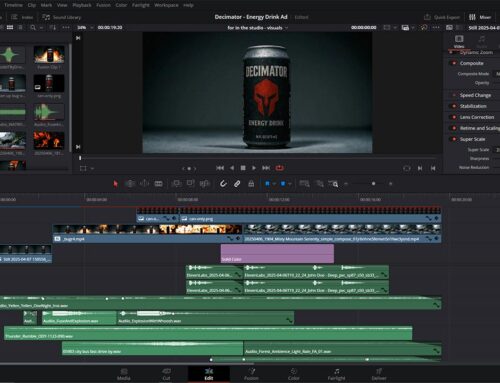Creating engaging and captivating content for YouTube requires creativity, research, and a knack for storytelling. Scriptwriting is a vital part of the process, as it lays the foundation for your video content. In recent years, Artificial Intelligence (AI) has emerged as a powerful tool for scriptwriters, providing assistance in various aspects of the scriptwriting process. In this article, we will explore how AI can help improve your YouTube scriptwriting, making your work more efficient and engaging.
AI for Idea Generation and Research
Coming up with fresh and exciting ideas is crucial for YouTube content creators. AI can assist in generating ideas and conducting research to support your scriptwriting process:
GPT-based Language Models
- GPT, or Generative Pre-trained Transformer, is a type of AI model that has been trained on vast amounts of text data.
- These models are capable of understanding natural language and generating coherent text based on a given prompt.
- By providing a simple seed idea or a topic related to your niche, you can leverage GPT-based language models to generate a list of potential ideas for your YouTube scripts.
AI-powered Research Tools
- AI can help you gather relevant information and data to support your script’s content.
- Platforms like Primer, Yewno, and Iris.ai use AI algorithms to sift through large volumes of information, extracting key insights and data points.
- By using these tools, you can quickly gather essential information to support your script, saving time and ensuring accuracy.
AI for Script Optimization
After drafting your script, AI can help you optimize it, making it more engaging and effective for your YouTube audience.
Natural Language Processing (NLP) Tools
- NLP tools analyze and understand human language, helping you identify areas of improvement in your script.
- Grammarly, for example, uses AI algorithms to detect grammar, spelling, and punctuation errors, and provides suggestions to improve your script’s readability.
- Other tools like Hemingway App or Readable.io focus on simplifying your text, identifying complex sentences, and suggesting ways to make your script more accessible to a wider audience.
AI-powered Sentiment Analysis
- AI can help you understand the emotional tone of your script and identify areas where adjustments may be needed.
- Sentiment analysis tools like IBM Watson Tone Analyzer or MonkeyLearn can analyze your script and provide insights into the emotions conveyed through your text.
- By understanding the emotional impact of your script, you can make necessary adjustments to better connect with your audience.
AI for Video Structure and Pacing
AI can also help you structure your video content effectively, ensuring that your story flows smoothly and keeps your viewers engaged.
AI-powered Video Outlining
- Tools like Lumen5 and Magisto use AI algorithms to analyze your script and create a video outline that optimizes the structure of your content.
- These tools can automatically identify key points in your script and create a logical sequence of scenes or sections.
- By using an AI-generated outline, you can ensure that your video is well-structured and easy to follow for your viewers.
AI for Pacing and Timing
- AI can help you determine the optimal pacing and timing for your YouTube videos.
- Platforms like Wibbitz and Videolicious analyze your script and recommend the best duration for each section of your video, ensuring a balanced and engaging pace.
- By optimizing your video’s pacing, you can keep your audience engaged and reduce the risk of viewers losing interest.
AI for Personalization and Audience Targeting
AI can help you tailor your YouTube scripts to better connect with your target audience, increasing the chances of viewer engagement and retention.
AI-powered Content Personalization
- AI algorithms can analyze your audience’s preferences, demographics, and behavior to create personalized content recommendations.
- – Tools like OneSpot and Cognitives use AI to analyze user data and identify content themes and styles that resonate with your target audience.
- – By understanding your audience’s preferences, you can tailor your YouTube scripts to better meet their expectations and interests.
AI for Language and Tone Adaptation
- AI can help you adapt your script’s language and tone to better suit your audience.
- Language models like GPT can be fine-tuned to generate text in different styles, tones, or dialects.
- By customizing your script’s language and tone, you can create content that is more relatable and appealing to your target audience.
AI for SEO and Keyword Optimization
To make your YouTube content more discoverable, AI can help optimize your script and video metadata for search engine optimization (SEO).
AI-powered Keyword Research
- AI can assist in finding the most relevant keywords for your YouTube content.
- Tools like Twinword Ideas and Keyword Tool use AI algorithms to analyze search trends and suggest high-performing keywords related to your topic.
- By incorporating these keywords into your script and video metadata, you can increase the visibility of your content on YouTube and other search engines.
AI for SEO Analysis
- AI-powered SEO tools can help you analyze your script and video metadata to ensure it is optimized for search engine ranking.
- Platforms like Surfer SEO and Clearscope use AI to analyze your content and provide recommendations for optimizing your script and metadata.
- By following AI-generated SEO suggestions, you can improve your content’s search engine performance and reach a wider audience.
In conclusion, AI offers a range of tools and techniques to help you improve your YouTube scriptwriting, from idea generation and research to content optimization and audience targeting. By leveraging AI in your scriptwriting process, you can create more engaging, personalized, and discoverable content that resonates with your audience and drives the success of your YouTube channel.








